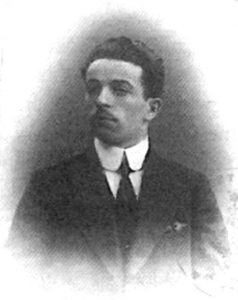Dr. Berek Lajcher -T2 prisoner
 Berek Lajcher was born on October 24, 1893 in Częstochowa in an assimilated Jewish family. In 1915 he moved to Warsaw and began studying at the Medical Faculty of the University of Warsaw. He joined the Academic Legion, later renamed the 26th Infantry Regiment. Lajcher was dismissed from military service on December 19, 1918 due to poor health. He worked as avolunteer at the Częstochowa Jewish Charity Society Hospital. On July 15, 1920, due to the Polish-Bolshevik war, Berek returned to the army, where he worked in military medical services throughout his service. Lajcher graduated from medical school in 1924, and a year later received his medical diploma.
Berek Lajcher was born on October 24, 1893 in Częstochowa in an assimilated Jewish family. In 1915 he moved to Warsaw and began studying at the Medical Faculty of the University of Warsaw. He joined the Academic Legion, later renamed the 26th Infantry Regiment. Lajcher was dismissed from military service on December 19, 1918 due to poor health. He worked as avolunteer at the Częstochowa Jewish Charity Society Hospital. On July 15, 1920, due to the Polish-Bolshevik war, Berek returned to the army, where he worked in military medical services throughout his service. Lajcher graduated from medical school in 1924, and a year later received his medical diploma.
In 1927, he and his family moved to Wyszków, where he lived and worked until the outbreak of World War II. Wyszków was bombed by the Germans on September 4, 1939, and four days later the Nazis entered the city. At that time, persecution of the Jewish population that was banished from the city intensified. Most of the Jews who survived the bombing of Wyszków went to Węgrów. Dr. Berek Lajcher and his family also went there. Most likely, at the beginning of 1940, he launched a medical practice in Węgrów, and then became a member of the Jewish Council and the Aid Committee at the Jewish Council. As a social activist, he was actively involved in organizing help for the most necessitous, among others thanks to his initiative, a folk kitchen was launched, he organized a hospital and bath to fight typhus.
In February 1941, the Germans imposed a ban on the Jewish population to leave the city, and on 24 August, access to Jewish districts for unregistered residents was banned. At dawn on September 22, 1942, the liquidation of the ghetto in Węgrów began. The Jews caught were forced to walk for 17 kilometers to the train station in Sokołów Podlaski, from where they were transported to the Treblinka II Extermination Camp. In the following days, a round-up of the remaining hiding inhabitants of the Węgrów ghetto began. In November 1942, a new, small and closed ghetto was created for the remaining Jews in Węgrów, and Berek Lajcher also found himself in this ghetto, most likely with his family.
On the night of April 26-27, 1943, the final liquidation of the ghetto in Węgrów began. Most of the inhabitants were shot on the spot, the others were taken to Treblinka II Extermination Camp. According to the witness’s report, as a result of these actions, the wife of Dr. Lajcher and his 13-year-old son.
Berek Lajcher ended up in Treblinka II Death Camp on May 1, 1943. There, he was probably sent to a working commando dealing with the classification of clothing and preparing it for shipment to Germany. After arriving at the camp, Dr. Lajcher immediately started activities in the camp underground, and after a few days – according to Samuel Rajzman’s account – he became one of the leaders of the planned rebellion. Dr. Berek Lajcher was killed on August 2, 1943 during an uprising at the Treblinka II Death Camp.
A.K
The material was prepared on the basis of: Weinfeld R., Tylko jedno życie – Berek Lajcher, “Midrasz”2013, no. 173/3, pp. 36-43.





